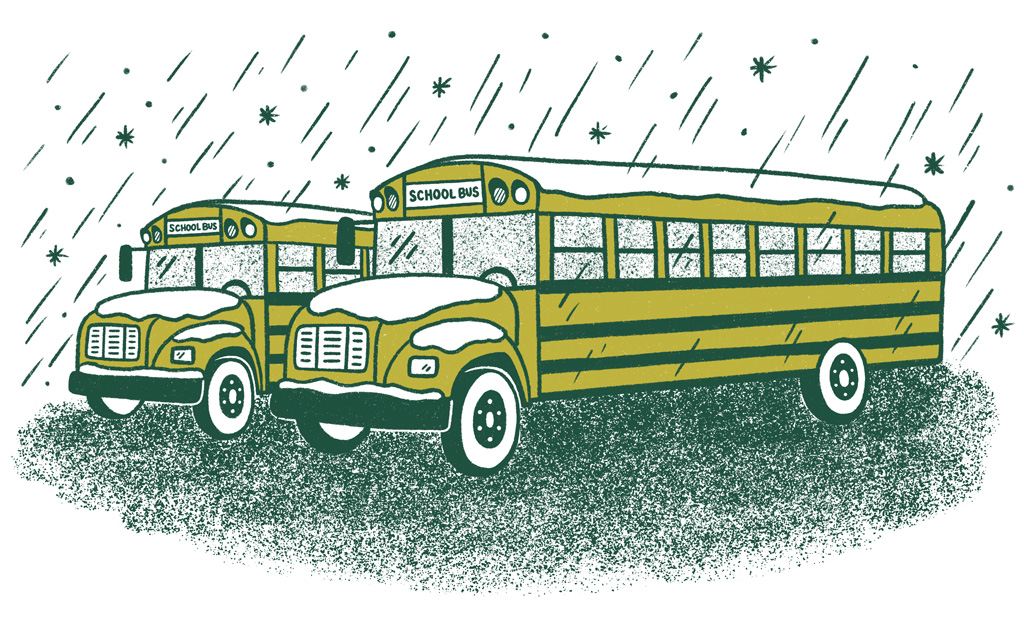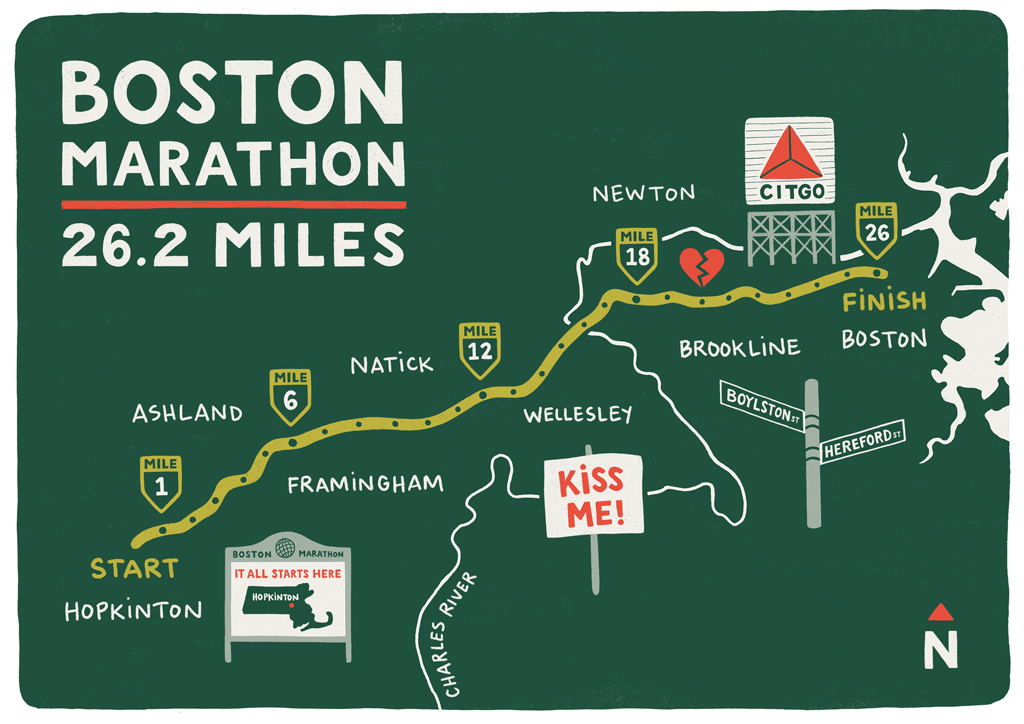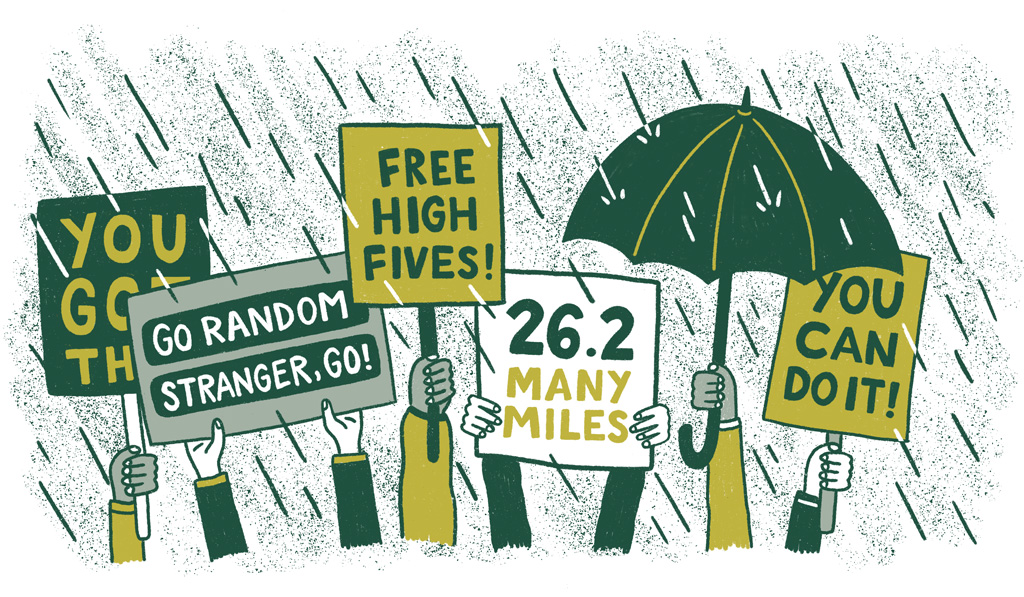Marathon Monday four years ago, I sat in a yellow school bus looking out a foggy window. Runners in bright rain gear lined up to board for the hour-long ride to the start line. Only a few hours earlier, birds had chirped outside my hotel. Perhaps everything would be fine, even the weather, I thought. But as the sun rose, the skies darkened.
It was April 16, 2018, the 122nd Boston Marathon.
The bus smelled like a musty eighth grade gym class. Runners sat elbow to elbow, dripping ponchos tucked under their legs. Some fidgeted with their bibs. Others tied and retied their shoelaces. I nibbled on a dry bagel, chewing until it was a paste in my mouth.
“Do you know how far it is to the start line?” I asked my seatmate.
“Twenty-six-point-two miles,” he said, grinning.
His humor was lost on me.

It seemed absurd that 30,000 people would run a marathon today in these conditions: near-freezing temperatures, pelting rain and brutal headwinds with gusts up to 50 mph. The worst weather in the event’s history, pundits said.
I trained hard for six months, and now this weather. Would it be all for nothing?
A few months earlier, I had filed for divorce and moved out of our house on a bicycle. I stuffed my belongings into plastic drawers at a friend’s apartment. I’d left a 16-year relationship, my dog and my home. My life felt like a failure. I needed something, even if I didn’t know what. Circling the drain of despair, I called my running coach. We decided I’d run the Boston Marathon. It’s the world’s oldest annual 26.2-mile race and a pinnacle event for runners. To register requires qualifying first, by posting a fast-enough time at another race. I needed a goal like this. Training would help me get through a challenging time, and the marathon would celebrate a new chapter.
For a long time, running had been my answer to everything. When I was a shy, awkward kid, running gave me confidence. Later, I ran to escape a failing marriage, lacing up anytime things got tough. When my dad died, I ran. Running is how I grieve and how I find joy. I’ve always been happiest in motion, returning to myself with each step. This was the first marathon I could train for without feeling guilty about spending time away from my partner. I had something to prove to myself—that running was worth caring about.
It’s easy to get swept up in the romance of the marathon, to believe that it will change your life. But “distance might not solve anything,” novelist Haruki Murakami wrote, “no matter how far you run.” To say that I was hoping the marathon would be a distraction from the turmoil is true, and when life didn’t go as planned, running was the only thing to do.

When you run, you notice each pine cone on the trail. The sky is blue. A wispy cloud diffuses the intensity of the sun. Fallen leaves soften each step, each breath. Time moves differently on a run, like “dreams passing in an un-traceable wandering,” Thomas Gardner wrote in Poverty Creek Journal, a book of running prose.
As training progressed, everything felt lighter. Focused on tempo runs and weekly mileage, I forgot about the divorce. The paces dropped. Each workout was better than the last. Pushed on by my running club teammates, I ran my fastest times ever. Training had gone so well that Coach thought I had a shot at a significant personal best.
The Boston Marathon’s rolling downhill course can be fast when your fitness and the weather align, when temperatures are moderate, and the wind blows at your back. In 2011, those perfect conditions pushed Ryan Hall to the fastest marathon ever by an American. The winner that year, Geoffrey Mutai, ran a world best and set the still-standing course record. I wanted that same magic.
When I stepped off the bus near the start in Hopkinton, though, my feet found wet slushy snow. Runners waiting for the start huddled under a large tent wrapped in emergency blankets and garbage bags, anything to stay warm. The wind whipped through the tent, practically lifting it off the ground. Each gust carried away more of my hopes of running a personal best.
“Just have fun,” said a man sitting on the ground a few inches away from me. “OK?”
I wrapped three trash bags around me and shivered. Just have fun? A beer at the finish line is fun, I thought. What’s fun about training for months on end, getting in the best shape of your life, only to be met by this?
The announcer called my group. I said goodbye to the just-have-fun guy and changed into racing flats. I wrapped each of my shoes in a trash bag, hoping to keep my feet dry. It didn’t work. My feet soon squished inside my shoes.
At the pop of the starting gun, runners rushed forward. The first mile, a steep downhill, jarred my cold muscles. I took deep breaths and tried to relax as the pack swarmed around me. Twenty-six-point-two miles, as my bus seatmate had reminded me, seemed very far away.
Most marathoners have an ultimate goal—the finish time they dream of and that they hope to achieve, even if it might take a little magic. Then there’s the realistic goal, the likely outcome. There’s a third goal, though. Call it the happy-enough goal. It’s not the time you hoped for, but you can live with it. Any time slower is a major disappointment. And any runner who has trained hard and still fallen short knows the feeling of missing even this goal.

But once the marathon starts, reality intrudes. Suddenly your stomach gives you trouble, or a hamstring flares up. Feet get hot spots and blisters. Sometimes you just feel “off” for no reason. Still, you push on. You do what you can.
In Boston that morning, fans undeterred by the storm lined the streets. Ink on their homemade signs streaked in the rain:
Free high fives! You are beating all the people behind you! I trained all week to hold this sign!
“Eyes up, everything forward.” Coach’s mantra often repeats in my head when I run. But my eyes were not up that morning. Head down, all I saw was rough pavement beneath my feet: streets narrow and off-camber, potholes and knee-deep puddles at every bend. Drizzling rain turned to a steady stream, and the easterly wind grew stronger.
My feet felt like pegs. A stabbing pain moved around my IT band from the hips to the knees. With each mile, drudgery grew—a musical rhythm building in tension but had no release, no break. Feet slapping the pavement, the rush of the wind, rain pounding, runners grunting. And then, a high-pitched commotion sounded in the distance. I lifted my eyes.
Just ahead was the famed Wellesley College students’ section, the spot on the course where spectators cheer and kiss runners. Ever since the first Boston Marathon in 1897, when Wellesley students reportedly came out to cheer on a particular Harvard student, the scream tunnel, as it’s known, has been a landmark. Not even cold rain stopped this tradition. Runners veered off the course to accept kisses.
Soon enough, the screams faded, and the road felt quiet, lonely and miserable again.
Marathoners like to say that Mile 20 is the true halfway mark of the race. This is the point where many hit the Wall, a dreaded place where fatigue prevails and momentum dies. From there, mental strength carries you to the finish line. The more you endure, the more you can. But when is enough, enough? Why do we keep going?
Trying to make sense of the marathon while running a marathon is futile. You are either swept up in the joy of it all or completely wallowing in misery. With each step, I considered dropping out. Motivation waned. Then I became negative about being negative, and hard on myself for not having fun, dammit.
My teammates ahead of me on the course would finish soon. Knowing they were also running kept me going. Besides, stopping would mean waiting in cold, wet clothes for a sag wagon ride to the finish line. Persevering was the fastest way to a hot shower.
Finally, the Citgo sign.
The landmark every Boston marathoner loves.
Right on Hereford, left on Boylston. The final turns before the finish line.
I leaned into the wind, my mind two steps ahead of my feet. Crossing the finish line, runners raised their arms, celebrating what the poet Mary Oliver calls “the pleasure of a body in this world.” As I crossed, and slowed to a walk, my legs nearly buckled. The clock was 12 minutes slower than my ultimate goal, still good enough, but it didn’t matter. I finished.
To run was to endure. To walk, now, was to feel everything at once. The pain and the cold and the disappointment.
Marathon training had gotten me through a difficult time in my life. My marriage was a failure and I had run to redeem myself. I’d hoped a personal best would give me something to be proud of, to prove that I was worthy, good at something. But in the end, it didn’t matter. Race results don’t define a person. Dedication does.
“The most important thing is to get out of wet clothes,” a race official shouted into a bullhorn. “Put your dry clothes on immediately.”
I did as I was told, but still shivered. I walked toward the park, hoping to dial a ride, but my hands were like claws, useless.
Another race official pointed me toward a hotel. Buttery light glowed from the circular door.
“You can go inside and get warm,” he said.
I stood in the middle of the street, trembling.
“What do you need?” the official asked, his voice gentle.
I couldn’t answer. I wanted a hot shower. A cheeseburger. A beer. I needed to get back to my hotel. But at that moment, all I wanted was a hug. I needed to know that the outcome didn’t matter and that I was good enough, whatever the clock said.
Tears ran down my cheeks, disappointment flooded my heart.
“What do you need?” the official asked again.
Water rolled off his yellow raincoat. He wrapped his arms around me, and finally, I let the warmth in.
